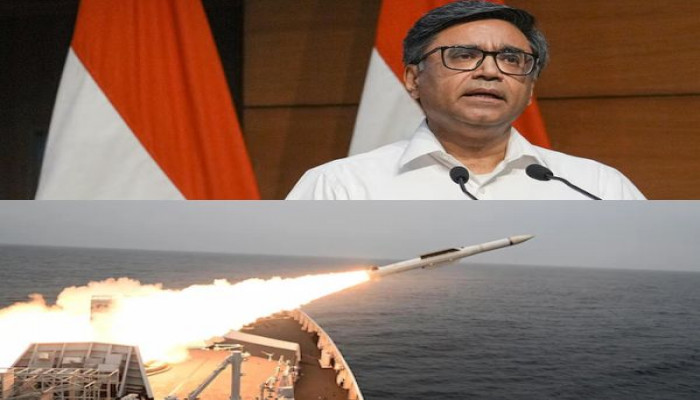No nuclear signalling by Islamabad in recent conflict, Misri tells Parliament
- In Reports
- 08:28 PM, May 19, 2025
- Myind Staff
There was no ‘nuclear signalling’ by Islamabad during the recent military standoff with Pakistan, Foreign Secretary Vikram Misri told Parliament on Monday evening.
Misri told the House's Standing Committee on External Affairs that the conflict remained “conventional.” He said Islamabad’s use of Chinese-made weapons, such as the HQ-9 missile defence system, was irrelevant because “what matters is we hit their air bases hard.”
However, he declined to comment on reports of Indian fighter jets being shot down by Pakistan’s air defences. The government denied allegations that Pakistan had downed five Indian jets, including at least three Rafales.
During the conflict, concerns arose that nuclear facilities, whether for weapons or civilian use, might be targeted. Pakistan raised these concerns to portray India as the aggressor and to ‘blackmail’ the Indian armed forces into submission. Prime Minister Narendra Modi rejected these claims.
Mr. Modi stated that India would not be intimidated by ‘nuclear blackmail.’ He declared, “Any terrorist safe haven operating under this pretext will face precise and decisive strikes.”
The Indian Air Force dismissed rumours that its strikes hit Pakistan’s Kirana Hills, which reportedly host Pakistan’s nuclear facility. Air Marshal AK Bharti jokingly told reporters he had never heard of Kirana Hills and thanked the media for the “tip.”
In a detailed briefing on Operation Sindoor, India’s military response to the Pahalgam terror attack, Misri said the United States played no role in the May 12 ceasefire.
He responded to questions about US President Donald Trump’s claims that he had prevented a ‘nuclear war’ between India and Pakistan and had ‘solved’ the Kashmir issue.
The Committee was informed that Pakistan reached out first on the afternoon of May 10, following Indian precision strikes against Pakistani military installations, including the Chinese-made HQ-9 system in Lahore and the strategically important Nur Khan air base.
Misri told the Committee that Pakistan’s Director-General of Military Operations contacted his Indian counterpart to request a ceasefire. He assured the panel that no ‘third-party mediation’ was involved.
Misri, who represented the government along with Colonel Sofiya Qureshi and Wing Commander Vyomika Singh during the 100 hours of conflict, faced questions about President Trump’s peace claims. The government clarified that neither Trump nor his administration played a significant role in halting the Indian military, which analysts say had Pakistan on the ropes.
Misri explained that Pakistan initiated the ceasefire appeal, and India agreed because Operation Sindoor had achieved its targets. The Committee also heard that India did not exchange trade favours with the US for the ceasefire. Trade, including ongoing free trade agreement negotiations, was never part of any ceasefire talks with the US or Pakistan.
Misri was asked about Turkey’s stance on the conflict. Ankara and Baku, Azerbaijan’s capital, publicly supported Pakistan after the Pahalgam attack and Operation Sindoor. Reports even suggested Turkey sent military aid to Pakistan.
Misri told the Committee that Turkey, often called one of the ‘three brothers’ alongside Pakistan and Azerbaijan, who have formed a nexus against India, has never been a traditional ally.
Operation Sindoor targeted and destroyed nine terror camps—four in Pakistan and five in Pakistan-occupied Kashmir. These included the headquarters of two major terrorist groups: Jaish-e-Mohammed, responsible for the 2019 Pulwama and 2016 Uri attacks, and Lashkar-e-Taiba.
A Lashkar offshoot, The Resistance Front, carried out the Pahalgam attack. The operation expanded as Indian air defence shot down or neutralised a barrage of Pakistani missiles and drones targeting Indian military and civilian sites over four consecutive nights.
India repeatedly warned Pakistan not to allow terrorist groups to operate from its soil. India cited mounting evidence linking Pakistan’s deep state to attacks worldwide.
Prime Minister Modi said Operation Sindoor marked a major shift in India’s anti-terror strategy.
Seven MPs, including Congress MP Shashi Tharoor, will lead all-party delegations abroad to explain this new doctrine.







Comments